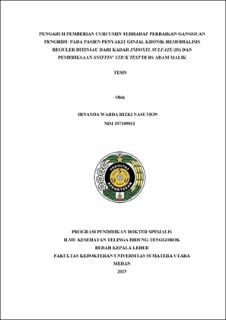Pengaruh Pemberian Curcumin Terhadap Perbaikan Gangguan Penghidu Pada Pasien Penyakit Ginjal Kronik Hemodialisis Reguler Ditinjau Dari Kadar Indoxyl Sulfate (IS) Dan Pemeriksaan Sniffin’ Stick Test di RS Adam Malik
The Effects Of Curcumin On Olfactory Dysfunction And Indoxyl Sulfate In Hemodialysis Patients

Date
2025Author
Nasution, Irnanda Warda Rizki
Advisor(s)
Munir, Delfitri
Haryuna, Tengku Siti Hajar
Metadata
Show full item recordAbstract
Introduction:Olfactory dysfunction in chronic kidney disease patients indicates
neurological disorders in uremic conditions that increase in prevalence along
with the severity of kidney disease. Indoxyl sulfate is a uremic toxin known to
contribute to the worsening of kidney disease. Curcumin plays an important role
in preventing disease pathogenesis due to its ability as an effective scavenger for
ROS or reactive oxygen species; curcumin also promotes the growth and viability
of olfactory ensheathing cells in normal and hypoxic conditions.
Method: This study is preliminary research because there is still very rare
research on this topic, conducted on 48 patients with stage 5 chronic kidney
disease on regular hemodialysis who were divided into three groups: control
group, 500 mg curcumin, and 1000 mg curcumin. They were given curcumin
extract for 12 weeks. Plasma indoxyl sulfate levels and then their olfactory
function was checked. Bivariate and multivariate tests were conducted to
compare the results before and after treatment.
Results: There were significant differences in olfactory discrimination delta
(p=0.001) and olfactory function delta (p=0.002) in the 1000 mg curcumin group
and the 500 mg curcumin group.There were significant differences in olfactory
identification before and aftertreatment in the 1000 mg curcumin olfactory group
(p=0.006), delta identification (p=0.618), as well as significant differences in IS
levels in the 500 mg curcumin group (p=0.008) and the control group (p=0.019); delta
IS level (p=0.870). There was no significant difference in olfactory threshold in the
three study groups (p=0.636).
Conclusion: Olfactory dysfunction in chronic kidney disease patients improved
with the administration of curcumin, and no worsening of indoxyl sulfate levels
was found, indicating that curcumin can stabilize the toxin.
Collections
- Master Theses [209]
